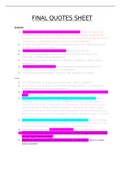FINAL QUOTES SHEET
Brabantio
1. “Look to your house, your daughter, and your bags!” Brabantio describes
Desdemona in among a list of possessions, plus names the house first as
though she is only of second most importance. Views her marriage as more of
a transaction or beneficiary than an act of love and happiness
2. “Is there not charms By which the property of youth and maidhood May be
abused?” brabantio to roderigo
3. “where hast thou stowed my daughter?” brabantio to othello
4. “Run from her guardage to the sooty bosom Of such a thing as thou”
brabantio to othello about desdemona
5. “thou hast practiced on her with foul charms,” brabantio to othello about
desdemona
6. “She is abused, stol'n from me, and corrupted By spells and medicines
bought of mountebanks. Brabantio to the duke
7. “She has deceived her father, and may thee.” brabantio to othello
Iago
1. “an old black ram Is tupping your white ewe.” iago to brabantio
2. “you’ll have your daughter covered with a Barbary horse. You’ll have your
nephews neigh to you.” iago to brabantio
3. “he tonight hath boarded a land carrack. If it prove lawful prize, he’s made for
ever.” iago to cassio
4. “Our bodies are our gardens, to the which our wills are gardeners.” iago to
roderigo- FEMINIST POWERMOVE. Allegory for control, garden used in
literature at this time, conceit used by shakespeare. Characters in this play
seem to be the product of certain inevitable, natural forces, which, if left
unchecked, will grow wild. Iago understands these natural forces particularly
well: he is, according to his own metaphor, a good “gardener,” both of himself
and of others.
5. “It is merely a lust of the blood and a permission of the will.” iago to roderigo
modern significance, puts responsibility on men to control their desires, men
must permit themselves to act on their lust, FEMINIST ICON <3
6. “an erring barbarian and supersubtle Venetian” iago to roderigo
7. “Sir, would she give you so much of her lips As of her tongue she oft bestows
on me, You’ll have enough.”
8. players in your housewifery, and housewives’ in your beds.” iago to emilia
about women
, 9. “You get up to play and go to bed to work”
10.“To suckle fools and chronicle small beer.” iago to desdemona about the ideal
woman; no matter how perfect, her purpose and worth still only simmers
down to her role as childbearer and talk of unimportant things
11.“I do suspect the lusty Moor Hath leap’d into my seat; the thought whereof
Doth, like a poisonous mineral, gnaw my inwards”
12.“I know our country disposition well; In Venice they do let heaven see the
pranks They dare not show their husbands” iago to othello about venetian
women
13. “it is a creature That dotes on Cassio; as ’tis the strumpet’s plague To beguile
many and be beguiled by one” iago about bianca. Describes bianca as ‘it’ and
‘a creature’ as though she as a prostitute is not even human and doesn’t
deserve such respect. Beguile can mean ‘charm and attract’ as well as ‘cheat’.
14.“This is the fruits of whoring”. This could reference either Desdemona’s
supposed adultery, or Bianca’s spiteful jealousy being the cause of the violence
observed. Either way, Iago blames female promiscuity and focuses on the far-
fetched ‘dangers’ it may hold, as opposed to denouncing Cassio’s abuse of Bianca
or supposed affair with Desdemona. Women are consistently denounced for
male actions, and all three women in the play suffer the consequences and pay
for the misplaced blame forced upon them by the treachery of men.
15.
Desdemona
“My downright violence and storm of fortunes May trumpet to the world. My heart’s
subdued”
“When I have spoke of you dispraisingly” desdemona to othello, significant for the
time considering his gender and rank, girl boss moment, not afraid to challenge
“stood within the blank of his displeasure For my free speech!” desdemona to cassio
about othello, othello has got upset that she dared answer back
“It is my wretched fortune.” desdemona to emilia and iago about her label as a
whore. The phrase “wretched fortune” holds many jarring sounds within itself,
mirroring the disjointed nature of Othello and Desdemona’s relationship. Perhaps
the reasoning for Othello’s ‘betrayal’ towards Desdemona, is not only due to his
submission to Iago’s malice and manipulation, but his wife betraying her father.





